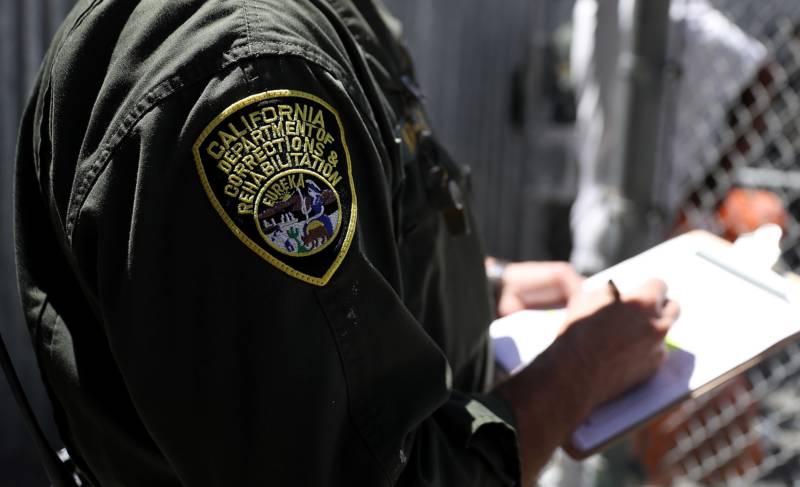A Vacaville man facing sex crime charges involving a 16-year-old girl in 2014 worked until late last year as a correctional officer for the state prison system, according to some of the first internal investigation files released by the Department of Corrections and Rehabilitation under California’s new police transparency law.
State Corrections Officer Fired for Lying to Police About Alleged Sex With Minor

The records show that prison guard Nathan Ortega became sexually involved with a teenager he met online.
Prison officials ultimately fired Ortega in 2018 for lying to Vacaville police officers about the “extent and nature” of his relationship with the girl.
Police arrested Ortega on June 21, 2018, under suspicion of sending harmful material to seduce a minor, contacting a minor to commit a felony, sexual penetration and oral sex with a person under 18.
“(She) trusted you because you had shared with her that you were a correctional officer,” the acting warden of the California Medical Facility in Vacaville wrote in a Nov. 15, 2018, dismissal notice to Ortega. “Your conduct brought discredit to yourself and the Department. Such conduct is not acceptable and will not be tolerated.”
Prosecutors charged Ortega in March with six felonies, according to the Solano County District Attorney’s Office.
Ortega first connected with the under-age girl in early 2014 through a website, records from the internal investigation show. In that initial chat, the girl revealed that she was 16 and lived in Los Angeles. Ortega responded that he was 31 and lived in Vacaville. They eventually exchanged phone numbers. The girl told Ortega that she lived in an abusive home she desperately wanted to leave.
Ortega told the girl he worked as a prison guard and could protect her.
Soon the two were texting daily, the records say. Ortega sent sexually explicit text messages to the Los Angeles teenager and asked her to send him pictures of herself nude. She sent 30 such pictures, according to the prison system’s report. Ortega sent two pictures of his erect penis to the girl, but he stopped when she became “uncomfortable” and asked him not to send any more.
Ortega also used video chat a few times and asked the girl to undress and masturbate in front of the camera.
In July 2014 the girl — then 17 years old — stayed with Ortega in his Vacaville home. She told Vacaville police that the two had intercourse once and oral sex a number of times over the nine-day visit, according to the prison system’s report.
Ortega purchased a plane ticket for the girl to visit a second time in December 2014.
The relationship sputtered out shortly after, when Ortega told her he liked her as a friend.
The young woman contacted Vacaville police in December 2017 to press charges, according to a disciplinary notice to Ortega.
“Now that (redacted) was older, she realized that she had felt taken advantage of and manipulated by you,” the record says.
A police officer interviewed Ortega on June 13 of last year about the girl’s allegations “that she was raped multiple times by you and there were some other sexual acts performed.”
Ortega repeatedly denied having had sex with the minor or ever using force. He eventually admitted the girl came to visit him once and they had oral sex.
“In actual fact, you and (redacted) engaged in numerous sexual acts,” the warden wrote, finding that Ortega’s dishonesty justified firing him.
The records show that Ortega confided in the Vacaville police officer that he was worried about his employment.
“I’m wondering what this will do to my job,” Ortega is quoted as saying. “It horrifies me that there’s any kind of potential that my ability to continue to do what I do might be affected by this.”
Ortega spent roughly a month in jail before posting $45,000 in bail. His case is scheduled for trial in Solano County in November.
Ortega’s attorney declined a request for comment while the case is ongoing.
The misconduct case was among 35 the California Department of Corrections and Rehabilitation released this month in response to a Jan. 1 public records request filed by a broad coalition of news organizations, including KQED.
Under a new state transparency law, Senate Bill 1421, all agencies in California that employ peace officers must release disciplinary reports for findings of sexual misconduct or dishonesty and all incidents in which an officer fired a gun or used any type of force that resulted in great bodily injury.
Most of the 2018 disciplinary cases released so far involve off-duty conduct that violated department policies.
For example, several cases that resulted in dismissals for dishonesty stem from employees lying or obfuscating during police investigations of domestic violence or driving under the influence.
Dishonesty was also the prison system’s basis for firing Ortega.
Only one dismissal among the 2018 cases released so far was based on sexual misconduct. Pelican Bay State Prison officials fired correctional officer Will Baptista after he was arrested in April of last year for allegedly raping and beating his girlfriend, according to summary records produced on that case.
The department also released findings on several allegations of excessive force and the firing of weapons. All of the officers who fired guns during inmate attacks or riots were exonerated of any wrongdoing.
An officer was disciplined for injuring his own hand and his wife’s leg in what appears to be an accidental gunshot while he was at home. Another officer was disciplined for improperly using force when he lifted an inmate up and slammed him to the ground.
Many of the case files are still incomplete. More cases and supporting materials for the files already produced, including internal affairs reports and video and audio recordings, are still being prepared for release.
Lisa Pickoff-White and Sukey Lewis of KQED News contributed to this report.
This story was produced as part of the California Reporting Project, a collaboration of 40 newsrooms across the state to obtain and report on police misconduct and serious use-of-force records unsealed in 2019.

